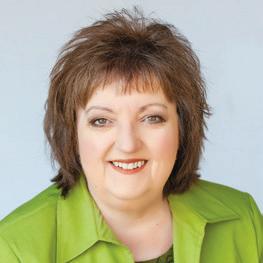
3 minute read
A MATTER OF COURAGE
Continued from page 19 the early church (including their martyrdom). Through the years, many women have answered the call from Isaiah 6:8 (NIV), “Then I heard the voice of the Lord saying, ‘Whom shall I send? And who will go for us?’ And I said, ‘Here am I. Send me!’” Women became teachers and preachers— despite traditional barriers or limited expectations.
Illustrating Matters
Sarah Crosby believed there was no other option but to follow the Lord’s leading to preach. It was a great risk in 18th century England. She preached in chapels, houses, barns, and open felds. In a letter of encouragement to another female preacher, she said, “Speak and act, as the spirit gives liberty, and utterance; fear not the face of man.” She eventually became one of Methodism’s frst licensed women preachers. —https://18thcenturyculture.wordpress. com/primary-sources/the-armenian-magazine/anaccount-of-sarah-crosby/
Maria Taylor, along with her husband in 19th century China, cofounded the Inland China Missions. She said, “As to the harsh judging of the world, or the more painful misunderstandings of Christian brethren, I generally feel that the best plan is to go on with our work and leave God to vindicate our cause.” —https://omf.org/about-us/our-story
In the 19th century, Catherine Booth accompanied her husband William to tent revival meetings around England. They founded the Salvation Army. She said, “I know not what He is about to do with me, but I have given myself entirely into His hands.” —https://www. salvationarmy.org.au/about-us/our-story/ourhistory/founders-william-and-catherine-booth/
Today, female disciples are still making courageous choices. Listen to this example from Paul Chilcote of a 20th-century female preacher who encountered opposition in the vestibule on her way to the pulpit. After an exchange of words, she fnally says, “Sir, I infer from your remarks that you are opposed to women preaching.” “I most certainly am!” he replied with emphasis. “So is the devil!” she responded and moved on to the pulpit.”1
There has been a multiplicity of opinions on the passages from 1 Timothy 2:12 and 1 Corinthians 14:34, 35, where Paul writes to the leaders of the Greek churches prohibiting women from teaching or speaking in the church. Many argue that these passages are “conclusive and fnal in an absolute sense and in all times and in all cultures.”2 If that be the case, one would have to deny God’s extraordinary calling of women such as Miriam and Deborah, and those in the early church, and throughout history and in modern times.
[Further study: Do a deep dive into God’s biblical structure of authority including the discernment of proper responses (e.g., to Christ, in the church, in society, etc.).]
We must be cautious, though, not to glory in the choice to be courageous. The ability to be courageous comes from God. “For the Spirit God gave us does not make us timid [fearful, cowardice] but gives us power, love, and self-discipline” (2 Timothy 1:7).
Illustrating Matters
2 Timothy 1:7 Commentary
“The parts which we should naturally have expected Paul and Timothy to fll are reversed in this letter. Paul ‘the aged,’ a prisoner, and soon to be a martyr, might have been expected to receive encouragement and consolation. But Timothy seems to have been of a somewhat weak and timid nature, and this letter of the dying man is one long trumpet blast to stir his courage.
It is a grave reminder to Christians of every age and degree that all cowardice, all dread of danger, all shrinking from doing one’s duty for fear of man’s displeasure proceeds not from the Spirit of God. The Holy Spirit does not work cowardice in man (us).
Mary was empowered to make a courageous decision. Love guided her action and with self-discipline she quietly displayed her nonconformance to the expectations of others. She was seeking only to serve Jesus and to be served by Him.” Elliott’s Commentaries for English Readers—https://biblehub.com/commentaries/2_ timothy/1-7.htm
The last thing Jesus said to Martha about Mary’s choice in Luke 10:42 was “it will not be taken away from her.” Jesus not only approved of Mary’s decision to join the disciples, but he also guaranteed she would not be deprived of her choice, or of its eternal benefts.
1 Jewish Encyclopedia, https://www.jewishencyclopedia. com/articles/5604-eliezer-liezer-ben-hyrcanus.
For the entire lesson and more information about the Spirit Matters series of books and curricula, go to whitewingbooks.com or call 1-800-221-5027.
Howard F. Broadnax
North Carolina
Ministers
Marion Thomas Caruthers
Tennessee
February 10, 2023











Licensed minister for 60 years
Samuel Malachi
William E. Harris
South Carolina
Johnson
Bahamas
Lonnie J. Grimsley


South Carolina
Aliser “Lisa” Denise Lewis-Brown

Maryland
Licensed minister for 39 years
Jackie M. McClure
January 19, 2023
Licensed minister for 39 years
David Nichols, Jr.
Licensed minister for 36 years
Howard R. Scott Tennessee
Licensed minister for 33 years
Gary Wayne White
Locksley Hubert McDonald
Bahamas
Licensed minister for 39 years
Milton E. Rainey
February 11, 2023







Stanley E. Murphy
Missouri

Licensed minister for four years
Akata Reia



Fiji
Licensed minister for four years
Iggie R. Taylor
Bahamas
Randall Waterman
Iowa








January 29, 2023
George Wyrosdick
Alabama
Robert L. Broach
South Carolina
March 23, 2021



MARSHA ROBINSON | EDITOR











